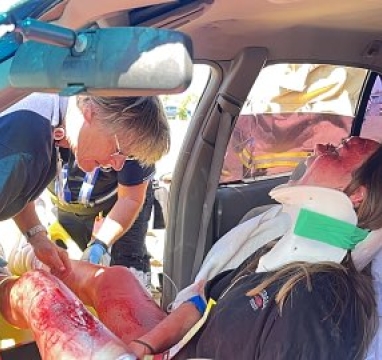It was only a drill. A planned exercise and mass casualty disaster scene for area first responders occurred on Aug. 19 at the Phelps County Fairgrounds. The exercise, hosted by Phelps Memorial Health Center, was aimed at sharpening the skills and improving knowledge in mass casualty triage.
The exercise not only taught triage but also the importance of cooperation and communication between multiple emergency response crews. Members of Phelps Memorial Emergency Services, Holdrege Police Department, Nebraska State Patrol, Phelps County Sheriff’s Department, Phelps County Emergency Management, Holdrege Dispatch, and members of fire and rescue squads from Holdrege, Funk, Wilcox, Loomis, Bertrand, Broken Bow, and Cozad were present at the drill. Helicopters from Tri-City Life Net, Good Samaritan Air Care, and Apollo also participated.
Sixty-two first responders began their morning in educational sessions learning about electrical safety, decontamination, and triage in a mass casualty situation. This was followed by a drill with the scene of a motor vehicle accident crash involving a chemical spill and broken power pole with down live lines.
The mock disaster included a pickup loaded with chemicals colliding into a car with down power lines. Because of the scenario, Southern Public Power District was brought to the scene to help shut the power down for emergency crews and firemen to begin extricating victims from the vehicles.
Over a dozen individuals volunteered to act as victims for the exercise. Volunteer actors spent the morning getting moulage applied for realistic-looking chemical and electrical burns, broken bones, and other severe injuries.
Tesha Broadfoot, Chief Nursing Officer at Phelps Memorial said, “This training allows first responders, law enforcement, and Phelps County Emergency Management to evaluate emergency management procedures and response in a mass casualty event. This event also allowed our emergency room to utilize our decontamination showers and decontamination processes.”
First responders triaged patients according to injury, with some transported to Phelps Memorial Health Center. Other volunteer patients were loaded into ambulances, and helicopters, or treated on-site. Kam Murray, PA, Phelps Medical Group, and Tiffany Weeder, APRN, Phelps Memorial emergency medical provider, also participated in the event.
Education for first responders included Electrical Safety, Triage, and Decontamination
Southern Public Power District employees Todd Bailey, Safety Director and Purchasing agent, Ethan Rundle, lineman, and Nic Osterbuhr, lineman, provided education with live lines. They demonstrated how to stay safe around electrical equipment using Southern Public Power District’s mobile electrical safety exhibit. With their trailer they were able to feature power lines, poles and transformers to highlight both the visible and hidden dangers of electricity. They showed firefighters and other first responders scenarios they may encounter. Whenever power lines are down and in contact with a vehicle, first responders must wait until line workers arrive to safely de-energize any live wires.
Todd Bailey said, “In an emergency, our team and first responders are intertwined.”
Nic Osterbuhr, SPPD lineman, said a main piece of advice he has for first responders is don’t assume the line is off. He said, “If power lines are involved call us and let us get there and shut it off before anyone goes into the scene. We don’t want one to turn one accident into several accidents.”
Todd Bailey shared a personal story of when he was a lineman. He said he took a shortcut when working on an underground switchgear. He was working with a contractor and a shortcut caused him to get electrocuted and be blown thirty feet back.
He said he was lucky and stated “They told my wife it was 50-50 if I would make it.”
Todd was in the burn center for ten days and at home recovering with care from his wife for 9 months and stressed the importance of safety and not taking things for granted. He said, “I wouldn’t want my worst enemy to go through it. Take safety seriously when dealing with power. When you leave the door you are expected to come home at the end of the day.”
Tiffany Weeder, APRN, and Austin Lambing, Paramedic at Phelps Memorial and Air Methods manager, educated first responders on chemical burns, electrical injuries, and the immediate actions needed prior to transfer.
Marlene Williams, Phelps Memorial emergency services, and coordinator of the event, reviewed triage guidelines told responders that anytime an event exceeds your resources a decision has to be made. The triage guideline, entitled SALT (sort, assess, life-saving interventions, treatment and/or transport) triage, is designed to help prioritize patients.
“Triage modes are determined based on what resources and personnel you have available,” she said.
Tim Williams educated attendees on the safety of farm chemicals. “The first thing you have to know is what you are dealing with. Some chemicals are more hazardous than others.” He added, “You don’t want to turn a two-gallon spill into a 200-gallon spill by adding water if not needed.”
He said first responders need to understand the chemical labels and there is an app on their phone for quick access to all chemicals.
This is a great event for Phelps Memorial emergency services, local fire, rescue, law enforcement, and municipal departments to work together as one team to save lives in a mass casualty event.



